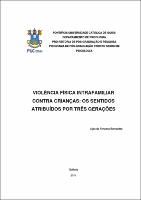| Compartilhamento |


|
Use este identificador para citar ou linkar para este item:
http://tede2.pucgoias.edu.br:8080/handle/tede/3575| Tipo do documento: | Dissertação |
| Título: | VIOLÊNCIA FÍSICA INTRAFAMILIAR CONTRA CRIANÇAS: OS SENTIDOS ATRIBUÍDOS POR TRÊS GERAÇÕES |
| Título(s) alternativo(s): | INTRAFAMILIAL PHYSICAL VIOLENCE AGAINST CHILDREN: THE SENSES ATTRIBUTED BY THREE GENERATIONS |
| Autor: | Bernardes, Lígia da Fonseca  |
| Primeiro orientador: | Sousa, Sônia Margarida Gomes |
| Primeiro membro da banca: | Francischini, Rosangela |
| Segundo membro da banca: | Borges, Lenise Santana |
| Resumo: | Neste estudo, buscou-se apreender os sentidos da violência física intrafamiliar contra crianças atribuídos por três gerações de famílias de classe popular. Este trabalho constitui um recorte da pesquisa intitulada Educar/criar sem violência: prevenção da violência física familiar contra crianças, realizada com famílias cujos filhos frequentam, ou frequentavam na época da pesquisa, a Escola de Circo, em Goiânia (GO), um dos programas de extensão do Instituto Dom Fernando (IDF) da Pontifícia Universidade Católica de Goiás (PUC-Goiás). A presente pesquisa enquadra-se no tipo qualitativo e todo o seu processo foi pautado nos pressupostos teórico-metodológicos da psicologia sócio-histórica de Vigotski, fundamentados na perspectiva do materialismo histórico e dialético. Participaram como sujeitos duas famílias, entrevistando-se membros de três gerações: avó, mãe e criança(s). Ressalva-se que em uma família foram entrevistadas duas crianças, totalizando sete sujeitos. A partir dos núcleos de significação dos sujeitos, apreenderam-se os sentidos da violência física intrafamiliar contra crianças para cada um deles. De forma geral, a violência física contra crianças foi e continua sendo um dos principais, se não o principal, método utilizado na educação/criação dos filhos das três gerações participantes. Identificou-se, porém, que embora seja um fenômeno naturalizado e banalizado pelas avós, mães e crianças entrevistadas, contraditoriamente, todos estes sujeitos expressaram sofrimento e/ou afirmaram seu pesar ao vivenciar tal violência. Concluiu-se que cada geração entende a violência física contra crianças de forma singular: para as avós, ela é legitimada, embora rejeitem a que deixa marcas físicas no corpo ou aquela que consideram mais grave; já as mães vivem uma reflexão sobre o seu uso na educação/criação dos filhos, embora encontrem dificuldade em interromper a aplicação deste método; por fim, as crianças relatam sofrimento ao serem vítimas, mas têm dificuldade em imaginar outros modelos de educação/criação. |
| Abstract: | This study aimed to apprehend the senses of intrafamilial physical violence against children attributed by three generations of popular class families. This work is part of the research named Educar/criar sem violência: prevenção da violência física familiar contra crianças, which dealt with families whose children participate, or participated at the time of the research, in Escola de Circo, in Goiânia (GO), one of the extension programs of the Instituto Dom Fernando (IDF) at the Pontifícia Universidade Católica de Goiás (PUC-Goiás). The present research is qualitative and all the process was based on the theoretical and methodological principles of Vigotski’s social-historical psychology, focusing on the historical and dialectical materialism perspective. Two families participated and members of three generations were interviewed: grandmother, mother, and child(ren). It is important to point out that one of the families participated with two children, totaling seven individuals. According to the core meanings of the participants, it was possible to apprehend the senses of intrafamilial physical violence against children attributed by each one of them. In a general perspective, physical violence against children was and continues being one of the main, if not the main, method used in the education of this three generations under study. Although it is a naturalized and banalized phenomenon for the interviewed grandmothers, mothers, and children, contradictorily, all these subjects expressed their suffering and/or affirmed their sorrow for having experienced such violence. In conclusion, each generation understands physical violence against children in a peculiar way: for the grandmothers, it is legitimated, although they reject the one that leaves physical marks in the body or the type they consider more severe; the mothers live a reflection about its use in their children’s education, although they find it difficult to interrupt the usage of this method of education; and finally, the children reported suffering when they are the victims, but it is difficult for them to imagine other models of education. |
| Palavras-chave: | Família. Famílias de classes populares. Psicologia sócio-histórica. Sentidos. Violência física intrafamiliar contra crianças. Family. Popular class families. Social-historical psychology. Senses. Intrafamilial physical violence against children. |
| Área(s) do CNPq: | CIENCIAS HUMANAS::PSICOLOGIA |
| Idioma: | por |
| País: | Brasil |
| Instituição: | Pontifícia Universidade Católica de Goiás |
| Sigla da instituição: | PUC Goiás |
| Departamento: | Escola de Ciências Sociais e Saúde::Curso de Psicologia |
| Programa: | Programa de Pós-Graduação STRICTO SENSU em Psicologia |
| Citação: | Bernardes, Lígia da Fonseca. VIOLÊNCIA FÍSICA INTRAFAMILIAR CONTRA CRIANÇAS: OS SENTIDOS ATRIBUÍDOS POR TRÊS GERAÇÕES. 2011. 174 f. Dissertação (Programa de Pós-Graduação STRICTO SENSU em Psicologia) - Pontifícia Universidade Católica de Goiás, Goiânia - GO. |
| Tipo de acesso: | Acesso Aberto |
| URI: | http://tede2.pucgoias.edu.br:8080/handle/tede/3575 |
| Data de defesa: | 28-Fev-2011 |
| Aparece nas coleções: | Mestrado em Psicologia |
Arquivos associados a este item:
| Arquivo | Descrição | Tamanho | Formato | |
|---|---|---|---|---|
| Ligia da Fonseca Bernardes.pdf | Texto Completo | 33,75 MB | Adobe PDF |  Baixar/Abrir Pré-Visualizar |
Os itens no repositório estão protegidos por copyright, com todos os direitos reservados, salvo quando é indicado o contrário.




